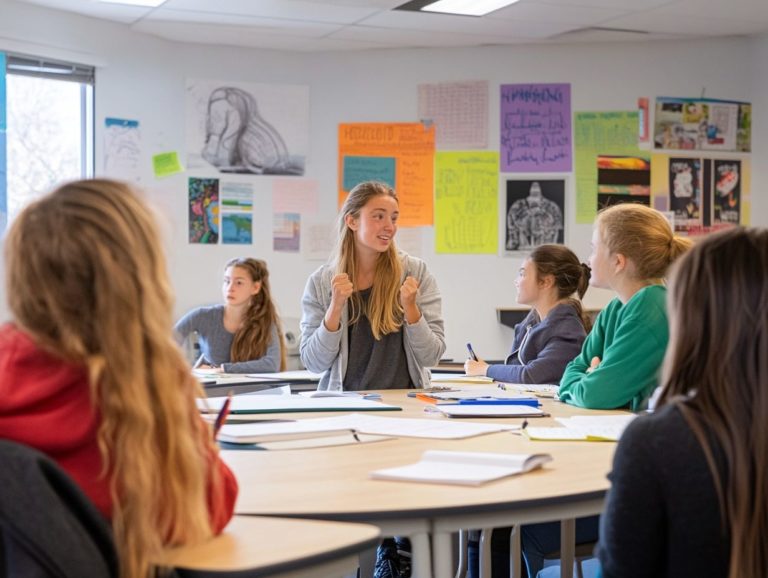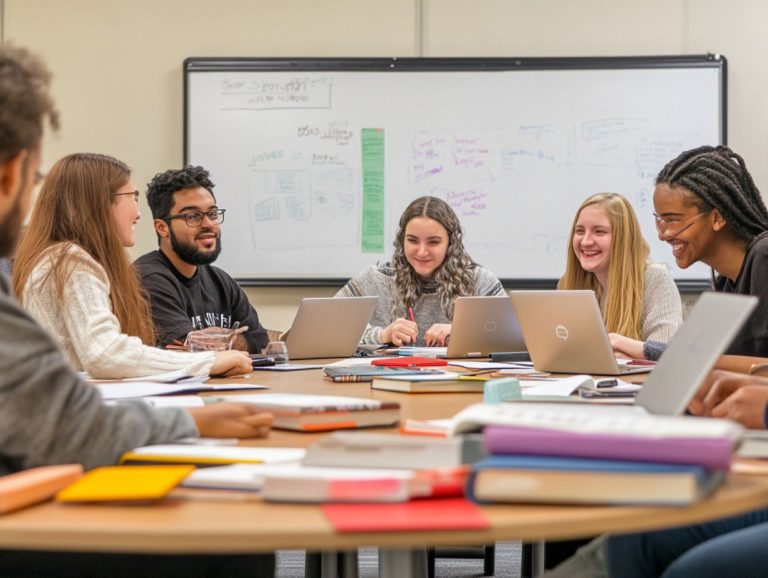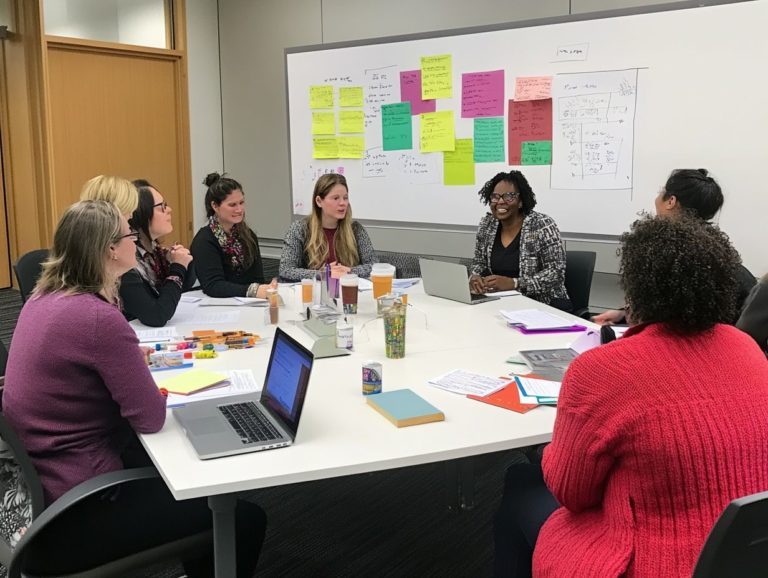the future of language courses: trends to watch
Language learning has changed a lot over the years, moving from traditional classrooms into a vibrant landscape enhanced by technology and innovative teaching methods.
Today, online platforms, personalized learning paths, and gamification are revolutionizing how you acquire new languages.
As you look ahead, advancements such as virtual reality and cultural immersion promise to enhance your experience even further.
Get ready to explore exciting trends and future possibilities in language learning! This article showcases the industry’s impact and how it increasingly makes language learning both accessible and engaging for you.
Contents
- Key Takeaways:
- The Evolution of Language Learning
- Current Trends in Language Courses
- The Future of Language Courses
- Impact on Language Learning Industry
- Frequently Asked Questions
- What are some current trends in the future of language courses?
- How will technology impact the future of language courses?
- Will traditional classroom-based language courses become obsolete?
- No, traditional classroom-based language courses will not become obsolete.
- What role will cultural immersion play in the future of language courses?
- How will the demand for lesser-known languages affect the future of language courses?
- What is the future outlook for language courses in terms of accessibility?
Key Takeaways:
Discover how language courses are evolving with technology!
Language courses are incorporating modern tools like online platforms, personalized learning, and gamification.
The future will see a rise in the use of artificial intelligence, virtual and augmented reality, and cultural immersion experiences.
These advancements will disrupt traditional methods, making language learning more accessible and inclusive for all learners.
The Evolution of Language Learning
The evolution of language learning has changed significantly over the decades, moving from traditional classroom settings to innovative methods that integrate technology.
You now have access to a wealth of resources, from online platforms to personalized education and adaptive learning.
In today s digital age, you can explore a variety of mobile apps and interactive courses tailored to fit different learning styles and cultural contexts.
This shift enables you to engage in effective language learning experiences, enhancing your linguistic skills and cultural fluency.
Current Trends in Language Courses
Current trends in language courses are evolving rapidly, especially with the rise of online learning platforms that prioritize personalized experiences just for you, highlighting the impact of technology on language courses.
Institutions such as Duolingo and Babbel lead the way by using gamification techniques, making your learning journey more enjoyable.
With mobile learning options, you can practice anytime and anywhere, providing flexibility that suits your lifestyle.
Community learning and language exchange initiatives now offer opportunities to collaborate with fellow learners and native speakers, enriching your conversational abilities and deepening your understanding of cultural nuances.
Online Learning Platforms
Online learning platforms like Duolingo, Babbel, and Memrise have transformed how you learn languages, providing a range of digital resources tailored to your learning style and preferences.
These platforms use cutting-edge technologies, such as adaptive learning, a method that adjusts the content based on your progress, and real-time feedback to enhance your experience.
By incorporating interactive exercises and gamification strategies, they create an environment that motivates you to practice consistently.
You can easily track your progress, which boosts your motivation and helps you set and achieve your goals.
With speech recognition technology, you can refine your pronunciation and listening skills, making language learning more intuitive than ever.
This seamless blend of technology and pedagogy highlights these platforms as critical tools in modern language education, ensuring you embark on a personalized journey that meets your individual needs.
Personalized Learning
Personalized learning in language education focuses on creating experiences that cater specifically to your unique needs, preferences, and goals.
By utilizing adaptive learning technologies and providing real-time feedback, educators can design interactive courses that enhance your language acquisition and retention.
This approach embraces the diversity of your learning style and encourages engagement, allowing you to progress at your own pace.
Adaptive tools assess your current proficiency and adjust the content, ensuring each lesson remains relevant and challenging without becoming overwhelming.
With real-time feedback, you receive immediate corrections, fostering a deeper understanding of language rules and nuances.
This tailored experience boosts your confidence and leads to more effective communication skills, transforming your language learning journey into something enjoyable and rewarding.
Gamification
Gamification in language learning transforms your educational experience into a captivating and interactive adventure. By incorporating game-like elements, you can enhance motivation and engagement, making the process enjoyable.
When educators weave in fun activities and short lessons, they pave the way for greater participation and improved retention in language courses. As you navigate through quizzes and challenges, you’ll progress at your own pace while enjoying each moment of the journey.
These interactive elements not only inject fun into learning but also foster a sense of achievement that keeps you eager for more. This approach resonates well because it taps into your innate desire for competition and accomplishment.
With immersive experiences, like virtual reality or role-playing scenarios, you become fully engaged. This significantly boosts your ability to absorb vocabulary and grammar. Such applications ensure that learning is a journey brimming with exploration and discovery.
The Future of Language Courses
The future of language courses will be influenced by advancements in computer systems that learn and adapt, virtual reality, and augmented reality. These cutting-edge technologies are poised to elevate your learning experience, making the top language courses for professionals in 2024 more immersive and fostering genuine cultural engagement.
You can expect language courses that are engaging and effective while emphasizing sustainability and broader awareness of global cultures.
This is not just about mastering linguistic skills; it s about enriching your understanding of the world around you.
Artificial Intelligence and Machine Learning
Artificial intelligence and machine learning are transforming your language learning experience, offering personalized education that adapts seamlessly to your pace and style. With conversational AI, you can engage in realistic language exchanges, boosting your conversational fluency and confidence in ways that traditional methods can’t match.
This innovative technology analyzes your progress, pinpointing strengths and weaknesses to create tailored lesson plans that resonate with your unique learning preferences. By simulating authentic conversations and providing instant feedback, these tools enhance vocabulary acquisition while immersing you in cultural contexts.
Adaptive algorithms ensure continuous assessment, keeping you motivated and appropriately challenged. You re no longer confined to conventional learning methods; instead, you can embrace a dynamic approach that fosters engagement and retention, making your journey to mastering a new language enjoyable and efficient.
Virtual and Augmented Reality
Virtual and augmented reality technologies are on the brink of transforming your language learning journey by offering immersive experiences in real-world cultural contexts.
With these technologies at your fingertips, you can practice language skills in lifelike scenarios, enhancing both retention and cultural fluency.
Imagine simulating authentic environments where you can engage in conversations at bustling markets, navigate historic landmarks, or partake in local festivities all from the comfort of your own home.
These interactive experiences make learning a new language enjoyable and facilitate contextual learning, helping you connect vocabulary and grammar to practical usage.
As educators embrace these innovations, they create dynamic classroom settings that allow you to collaborate and communicate in ways you may have thought were impossible.
This opens the door to an amazing learning adventure tailored just for you.
Start your language adventure today!
Incorporation of Cultural Immersion
Incorporating cultural immersion into your language courses elevates the learning experience by exposing you to authentic cultural contexts and practices. Engaging in language exchange programs and community learning initiatives allows you to connect with native speakers, deepening your understanding and appreciation of diverse cultures.
These interactions enhance your vocabulary and grammatical skills while providing valuable insights into the nuances of everyday conversations. Participating in cultural exchanges gives you the chance to practice your language skills in real-life situations, making the learning process memorable and impactful.
Through community learning, you can build exciting friendships that last beyond the classroom, fostering a supportive environment where both language and culture can be explored in depth. These experiences underscore that effective language acquisition goes beyond mere words; it flourishes in context, connection, and shared experiences.
Impact on Language Learning Industry
The language learning industry is undergoing a remarkable transformation, largely propelled by the disruption of traditional methods due to the COVID-19 pandemic. This shift has accelerated the move toward online and remote learning, enhancing accessibility and inclusivity.
Now, learners from all walks of life can engage with language education more easily than ever, opening up a world of opportunities previously beyond reach.
Disruption of Traditional Methods
The disruption of traditional language learning methods has led to a surge in the popularity of online classes and mobile learning applications. As you navigate this new landscape, you’ll find educators increasingly harnessing technology to offer flexible, engaging, and effective language learning experiences.
This shift has transformed the educational environment, enabling you to interact with native speakers through virtual platforms. You can access a wealth of diverse resources and dive into interactive exercises anytime and anywhere.
Online classes, often conducted by experienced instructors from around the globe, bring rich cultural context to your learning process, deepening your understanding of language nuances.
Mobile applications add an exciting layer by incorporating gamification using game-like features to make learning fun and providing instant feedback, catering to various learning styles to help you stay motivated and enhance retention. This evolution represents a broader rethinking of how languages can be taught and learned in today s fast-paced world.
Increased Accessibility and Inclusivity
Increased accessibility and inclusivity in language learning have been greatly enhanced by the abundance of online platforms and digital resources available to you. These advancements enable learners from diverse backgrounds and abilities to immerse themselves in language education, creating a vibrant and inclusive learning environment.
With innovative tools such as language exchange apps, interactive online courses, and virtual reality learning tools, you can learn at your own pace, tailor your educational journey to meet your unique needs, and connect with native speakers from around the world.
These digital resources frequently offer multilingual support and adaptive learning technologies designed to accommodate different learning styles, ensuring that you have equal opportunities to thrive.
Ultimately, the democratization of language learning through online avenues boosts your proficiency while bridging cultural gaps, fostering mutual understanding and appreciation in our increasingly interconnected world.
Frequently Asked Questions
What are some current trends in the future of language courses?
Some current trends in the future of language courses include using technology such as online language learning platforms, incorporating cultural immersion and real-world application, and the growing demand for language courses in 2024.
How will technology impact the future of language courses?
Technology will greatly impact the future of language courses by providing more accessible and personalized learning options, such as virtual and augmented reality tools, artificial intelligence tutors, and mobile apps for language practice.
Will traditional classroom-based language courses become obsolete?
While traditional classroom-based language courses will still have their place, the rise of online learning and technology suggests they may evolve significantly to integrate more digital and interactive elements, enhancing the learning experience.
No, traditional classroom-based language courses will not become obsolete.
While technology plays a larger role in language learning, face-to-face interaction with instructors and peers is still valuable. This aspect will remain a significant part of language courses.
What role will cultural immersion play in the future of language courses?
Cultural immersion is crucial for language learning. This means experiencing a culture directly, like through travel or local activities, which enhances the learning experience.
How will the demand for lesser-known languages affect the future of language courses?
More people are interested in learning languages like Mandarin, Arabic, and Korean. This demand will increase the availability of courses and resources, promoting cultural diversity.
What is the future outlook for language courses in terms of accessibility?
The future of language courses is bright and full of possibilities! Technology and online platforms will make learning more accessible and affordable for everyone.




